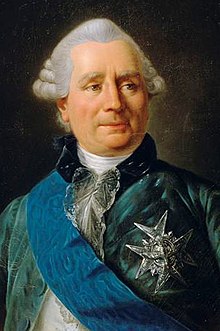Charles Gravier, Comte de Vergennes
| Charles Gravier de Vergennes | |
|---|---|
 |
|
| Chief Minister of the French Monarch | |
|
In office 21 November 1781 – 13 February 1787 |
|
| Monarch | Louis XVI |
| Preceded by | Count of Maurepas |
| Succeeded by | Archbishop de Brienne |
| Minister of Foreign Affairs | |
|
In office 21 July 1774 – 13 February 1787 |
|
| Monarch | Louis XVI |
| Preceded by | Henri Bertin |
| Succeeded by | Count of Montmorin |
| France Ambassador to the Ottoman Empire | |
|
In office 1755–1768 |
|
| Monarch | Louis XV |
| Preceded by | Pierre Puchot |
| Succeeded by | Count of Saint-Priest |
| Personal details | |
| Born |
29 December 1719 Dijon, France |
| Died | 13 February 1787 (aged 67) Versailles, France |
| Political party | Non-partisan (Conservative) |
| Spouse(s) | Anne Duvivier (m. 1730–87); his death |
| Children | Constantin Louis |
| Profession | Diplomat, statesman |
| Religion | Roman Catholicism |
Charles Gravier, Count of Vergennes (29 December 1719 – 13 February 1787) was a French statesman and diplomat. He served as Foreign Minister from 1774 during the reign of Louis XVI, notably during the American War of Independence.
Vergennes rose through the ranks of the diplomatic service during postings in Portugal and Germany before receiving the important post of Envoy to the Ottoman Empire in 1755. While there he oversaw complex negotiations that resulted from the Diplomatic Revolution before being recalled in 1768. After assisting a pro-French faction to take power in Sweden, he returned home and was promoted to foreign minister.
Vergennes hoped that by giving French aid to the American rebels, he would be able to weaken Britain's dominance of the international stage in the wake of their victory in the Seven Years' War. This produced mixed results as in spite of securing American independence France was able to extract little material gain from the war, while the costs of fighting damaged French national finances in the run up to the Revolution. He went on to be a dominant figure in French politics during the 1780s.
Charles Gravier was born in Dijon, France in 1719. His family were members of the country aristocracy. He spent his youth in a townhouse at Dijon and on the family's country estates. He had an elder brother Jean Gravier, marquis de Vergennes, born in 1718, who eventually inherited the family estates. His mother died when he was three, and his father subsequently remarried. Vergennes received his education from Jesuits in Dijon. In 1739, at the age of twenty, he accepted an offer to go to Lisbon as an assistant to Théodore Chevignard de Chavigny who was mutually referred to as his "uncle", but was in fact a more distant relative. Chavigny was an experienced diplomat and secret agent who had been made ambassador to Portugal.
The objective of Chavigny and Vergennes in Lisbon was to keep Portugal from entering the War of the Austrian Succession on the side of Britain, a task that proved relatively easy as the Portuguese had little interest in joining the war. In 1743 Vergennes accompanied his uncle to the court of Charles VII who was the ruler of Bavaria and also held the title of Holy Roman Emperor. Charles VII was a key ally of the French in the ongoing war against Austria, and they were charged with keeping him in the war by assauging his concerns which they accomplished successfully. They next were instrumental in the agreement of the Union of Frankfurt, a pact involving several German rulers to uphold Charles VII's interests. after Charles VII's sudden death in 1745, they strove to help his successor Maximilian III but were unable to prevent him from losing his capital at Munich and making peace with the Austrians at the Treaty of Füssen. In November 1745 Chavigny was relieved of his post, and returned to France accompanied by Vergennes. The following year they returned to Portugal to take up their previous posts there where they remained until 1749, unsuccessfully trying to negotiate a commercial treaty.
...
Wikipedia
